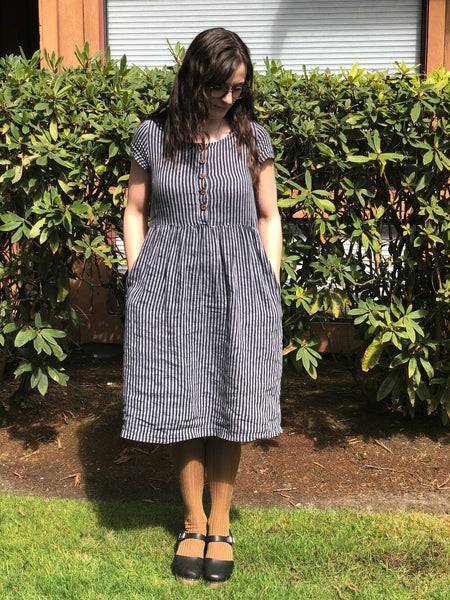Meet Devyn Cameron, a dedicated Pediatric Nurse Practitioner who does it all. She’s a lactation consultant, with a special interest in lip and tongue ties, who also works with teens struggling with anxiety and depression. She has been kind enough to give us some helpful beginners breastfeeding tips for new and expecting moms (see the feature below)! Devyn knits, owns an urban farm with a mini herd of rescued animals (the dream!) and grows vegetables and fruit. Take a peek into her day to day life and check out her instagram @devyncatcam.

Hi! I'm Devyn Cameron. I am a Primary Care Pediatric ARNP, and Lactation Educator, for a pediatric practice in Western Washington. I have worked in the same clinic since 2012, originally as a Registered Nurse. While in graduate school, I went on to do my clinical training at the same clinic and then was hired on afterward as a nurse practitioner. I also bring my children here and visited a Pediatrician with the clinic as a young child, so it has been a really fun, full-circle journey to end up where I'm at in a primary care position. I work part-time so I can be home with children as much as possible, my husband and I have an 8 yr old and a 4 yr old and recently found out we are expecting our 3rd child!
We live in the city but are blessed to have a large city lot, about a 1/4 acre, and have a little urban "farm" at home, with lots of pets (including a flock of backyard chickens, 5 cats and a Catahoula Leopard dog! All our cats and dog are from local rescues and we intermittently foster kittens from a Seattle are based rescue organization) and grow a variety of fruits and vegetables. I'm involved in a local Episcopal church, teaching Sunday school and singing in the church band. I love to knit and typically end each day with a cup of tea and a knitting project with an audiobook on in the background.

What is a typical day for you?
Every day is different in my job! It's ever changing and never boring. I'm constantly learning new things. I feel so blessed to genuinely love my job and this is one of the reasons why! I typically see anywhere from 16-25 patients per day, ranging from birth to age 21. The number of appointments per day varies greatly depending on the season (flu season or well visits/back to school etc). I work really hard to provide personalized care to each family so I offer 30 min well visits and then shorter appointment slots for other various acute needs like sore throat, earache, cough, minor injuries, etc. I usually get to see 1-2 newborn babies per day, which I absolutely love, and I often provide lactation support to mom and baby during these visits. I have a special interest in tongue and lip ties and how they relate to breastfeeding so I often see 1-2 patients per week for evaluation and revision of restrictions.
I also manage quite a bit of teen anxiety and depression, which is an area of medicine I did not intend to practice so much in, but has turned out to be another area of great interest. I work closely with our pediatric behavioral health specialist to provide the most evidence based mental health care possible, sometimes ordering genetic testing to help us determine the best fit for meds. I truly believe the future of many prescription medications will incorporate pharmacogenetic testing! The technology available now is pretty incredible.
I'm an adjunct faculty member with Vanderbilt University so I frequently have a Vandy ARNP student working with me at various times throughout the year. Teaching students was something I was reluctant to agree to but has provided a wonderful way for me to contribute to the next generation of nurse practitioner providers and affords me a way to learn all sorts of new information from each round of new students I work with. This summer marked the end of my 5th year of practice as an ARNP which meant I had my first round of patients entering kindergarten to whom I have been providing care since birth, which was a really fun experience. Seeing them all head out to start school and reminiscing with parents about their first baby visits,- it's so special! This really reinforced why I went into primary care, to be able to partner in raising children with their families is such an incredible position to be in and I'm so thankful to have found a place that I can do this!

Any breastfeeding tips for our new & expecting moms?
First off- breastfeeding is a learned skill for both baby and mama! It takes practice, patience and persistence. There are some mothers to whom breastfeeding comes easily but for many of us (myself included), the first few days and weeks can be really difficult, and at times, overwhelming! With time (typically 2-4 weeks), and often with help, breastfeeding will become easier!! Also, remember that there are lots of ways to feed a baby. Not all women are able to, or choose to breastfeed, and that's ok! :)
How to Latch:
When learning to breastfeed a baby, it can be helpful to start out by bringing the baby's chin to the breast first, pointing the nipple towards the babies nose, then waiting for a big open mouth and "flipping" the nipple back into the mouth. The nipple should fill the babies mouth, reaching the junction of the hard and soft palate. I will often have mom's look up videos of the "flipple technique" on YouTube for help visualizing this. Changing positions (such as cross-cradle, football, side-lying) and using breast compression while nursing can help facilitate improved latch and increased milk transfer.
One of the most important pieces of breastfeeding is having a good latch and comfortable position.
Signs of a good latch include:
-
Little to no pain for mom (except for maybe the first minute or so and should be mild and improve with time)
-
You can see baby making deep jaw movements and swallowing after initial rapid shallow sucks
-
Short pauses as nursing continues
-
Baby appears content when finished and doesn't fall asleep shortly after latching
-
Baby's lips are flared around the nipple (lips are not folded under or tucked)
-
Most of the areola is not visible while baby is feeding
-
Nipple shape is not pinched or lipstick-shaped after baby comes off the breast.
-
Baby's neck, head and shoulders are in alignment and baby's tummy is facing towards mama's tummy (baby should not have to turn head sideways to nurse)
Initially, many people experience a bit of nipple soreness while learning to breastfeed, this can be normal. However, if the pain is severe or persistent, ask for help! Latch should be assessed, as well as oral anatomy (checking for things like tongue tie).
I think it's also important to keep in mind that not all women find breastfeeding enjoyable. Even when it becomes easier, some women report discomfort with milk let-down or the initial latch, this does not necessarily mean something is wrong. I think it's still important to check in with a lactation provider to ensure there isn't something to do to help ease the discomfort but I also encourage mom's to try not to feel like they are doing something wrong if they feel this way.
I encourage my patients to breastfeed as often as possible, spending as much time near their baby as they can and holding their child skin to skin frequently. There is no such thing as a spoiled baby (and arguably no such thing as an overfed breastfed baby!), so feel free to snuggle and hold your baby as much as possible! One of my favorite sayings at the newborn visit is that a mama's job is to rest and heal and learn to feed their baby! This often means putting aside the other stuff in the house and really taking the time to allow you and your baby to learn this new skill! Give yourself grace and don't be afraid to ask for help if you're struggling.
Other helpful tips:
-
Bring the baby to the breast, not the breast to the baby. This can mean using a stool, ottoman or books to prop up mama's feet and bring knees up and/or using a supportive pillow like a Boppy or My Brest Friend.
-
Use breast compressions while nursing! This helps increase the flow of milk and can greatly increase milk transfer. This can also be helpful if your baby starts to fall asleep in the middle of a feeding.
-
Remember that your baby's tummy is very small and needs frequent filling! Feeding your baby on demand, 8-12 times (or sometimes more) per day is normal and important, especially in the early days, for developing a strong milk supply.
-
Milk can take a few days to come in, average is 3-5 days but if mama had a cesarean birth, labor was induced, or if mom had an epidural during labor, (basically any situation where a large volume of IV fluids were given), this can cause a delay in lactogenesis and can also sometimes cause a baby's birth weight to be elevated making it seem like a baby is losing an excessive amount of weight. These situations require close monitoring, with an experienced lactation provider, but do not always indicate a need for supplementation.
-
Crying is a late sign of hunger so pay attention to early feeding/rooting cues like smacking lips, putting hands/fingers in mouth, turning head side to side, opening mouth widely. Breastfeeding early and often can make nursing a bit easier, as latching a calm baby is much easier than latching a frantic, crying baby.
-
Have your baby sleep nearby so that you can get to them quickly and feed them shortly after they wake up.
-
Limit the use of a breast pump in the early days. (Unless you have been instructed to pump to increase supply/for supplement by a lactation provider). The first 4 weeks are the most important for developing a strong milk supply and we want baby to set the pace and determine what milk the body needs to make, not the pump. It can also be helpful to avoid or limit the use of bottles during the first 4 weeks of an infant's life or at least until breastfeeding is well established. There is lots of conflicting information about early pacifier use and I think it all boils down to opinions. I'm of the mindset that if breastfeeding is going well, baby is gaining appropriately and a parent chooses to use a pacifier for their baby early-on, it's probably fine, but if in doubt, check in with a local lactation provider!
Evidence-based breastfeeding resources: kellymom.com, lalecheleague.org, Stanford Breastfeeding medicine has lots of good videos on latch and pumping tips.
